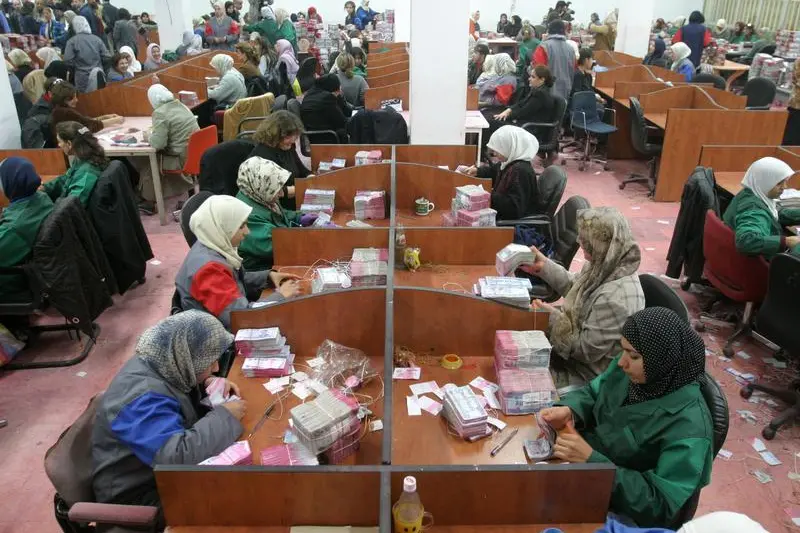PHOTO
12 October 2015
Iraq's newly endorsed Islamic banking law will help sharia-compliant lenders gain market share and participate in the financing of strategic projects in the country, said Central Bank of Iraq Governor Ali Mohsen Ismail.
State banks dominate Iraq's banking system. There are 13 Islamic banks operating in country which together accounted for 23.1% of the total capital of the private banking sector in 2014, Ismail told Zawya.
"Islamic banks will be able to attract more deposits and savings, and will also be able to help finance many of Iraq's main economic sectors, in addition to financing big projects that are considered to be the main drivers of the country," he said in an interview over the weekend.
The law, which was passed by parliament earlier this month, set the minimum paid-in capital for Islamic banks at IQD 250 billion (USD 210.5 million) - IQD 100 billion upon incorporation and the remainder to be settled in three equal annual installments. Islamic banks must appoint a sharia supervisory board upon incorporation with approval from the central bank.
The law, which was published on parliament's website, exempts Islamic banks from paying taxes or duties for transactions involving real estate assets or cars under murabaha (cost plus financing) or ijara (lease) structures that end in the transfer of the asset to the customer or co-ownership of the asset.
Overall assets of Iraqi banks reached around IQD 200 trillion at the end of 2014 -- 90% of which are owned by state-run commercial banks and 10% by private banks, which practice both commercial and Islamic banking, according to Mazhar Mohammed Saleh, an economic adviser to the Iraqi government.
"The market share of Islamic banks in the Iraqi banking sector currently stands at 25%. Following the law's endorsement, we can expect the share to reach 40% by 2020," he told Zawya.
Jabbar Al Ebadi, a member of parliament's finance committee, said he expected several commercial banks to convert to Islamic banks after the passing of the new law. He said the new law would also help revive sectors related to the Islamic economy such as halal tourism and halal food trade with the introduction of more sharia-compliant financing instruments.
© Zawya 2015
Iraq's newly endorsed Islamic banking law will help sharia-compliant lenders gain market share and participate in the financing of strategic projects in the country, said Central Bank of Iraq Governor Ali Mohsen Ismail.
State banks dominate Iraq's banking system. There are 13 Islamic banks operating in country which together accounted for 23.1% of the total capital of the private banking sector in 2014, Ismail told Zawya.
"Islamic banks will be able to attract more deposits and savings, and will also be able to help finance many of Iraq's main economic sectors, in addition to financing big projects that are considered to be the main drivers of the country," he said in an interview over the weekend.
The law, which was passed by parliament earlier this month, set the minimum paid-in capital for Islamic banks at IQD 250 billion (USD 210.5 million) - IQD 100 billion upon incorporation and the remainder to be settled in three equal annual installments. Islamic banks must appoint a sharia supervisory board upon incorporation with approval from the central bank.
The law, which was published on parliament's website, exempts Islamic banks from paying taxes or duties for transactions involving real estate assets or cars under murabaha (cost plus financing) or ijara (lease) structures that end in the transfer of the asset to the customer or co-ownership of the asset.
Overall assets of Iraqi banks reached around IQD 200 trillion at the end of 2014 -- 90% of which are owned by state-run commercial banks and 10% by private banks, which practice both commercial and Islamic banking, according to Mazhar Mohammed Saleh, an economic adviser to the Iraqi government.
"The market share of Islamic banks in the Iraqi banking sector currently stands at 25%. Following the law's endorsement, we can expect the share to reach 40% by 2020," he told Zawya.
Jabbar Al Ebadi, a member of parliament's finance committee, said he expected several commercial banks to convert to Islamic banks after the passing of the new law. He said the new law would also help revive sectors related to the Islamic economy such as halal tourism and halal food trade with the introduction of more sharia-compliant financing instruments.
© Zawya 2015





















